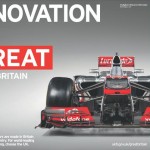 Formula 1 motor racing may be typified by glitz and glamour, but it’s also typified by some of the most advanced technology on the planet. The competition is frequently accused of relegating the role of the driver as technological advantages seem to predominate the chances for success.
Formula 1 motor racing may be typified by glitz and glamour, but it’s also typified by some of the most advanced technology on the planet. The competition is frequently accused of relegating the role of the driver as technological advantages seem to predominate the chances for success.
It would be easy to think, therefore, that innovation is the key to success in the sport, but a recent study reveals that not only is that not the case, attempts to radically innovate may hamper ones chances of success.
When innovation hampers success
The researchers examined the behaviors and performances of 49 teams over a 30 year period, and found that the teams that attempted to innovate the most rarely performed well on the track. What’s more, these radical innovators were least successful at times of major change in the industry, such as when new rules were introduced.
“We found that it wasn’t always good to be the aggressive innovator,” the authors say. “The conventional wisdom that companies need to embrace change is often wrong.”
The authors chose Formula 1 both because it is a hotbed of innovation, and also an arena that is prone to having changes forced upon them by the governing body for the sport. These rules guide the technologies that are allowed, and therefore determine the shape innovations must take.
The relationship between innovation and success
When the authors analyzed the relationship between innovation and success, a few things stood out. They found that innovation was great, just so long as it was in small doses. More innovation didn’t translate into success on the track, with this particularly true after major rule changes were introduced.
“Teams sometimes believed that the more the rules changed, the more they had to change along with them,” the authors say. “But we found that small, incremental improvements were often better than big changes.”
The authors suggest that this is due to the inherent complexity of the cars themselves. Changing one part of the car therefore can often result in other parts having to be changed too, even if you didn’t really want to.
Instead, the better route seemed to be to tinker at the margins where you can make gains without disturbing other parts of the system too much.
This was emphasized by the introduction of KERS technology in 2009. Despite the potential upside of the technology, the standings were dominated by teams that didn’t even try to implement it.
“The KERS example in Formula One shows the dangers of jumping too quickly at the chance to innovate,” the authors say. “You don’t always get an advantage by moving first.”
What lessons can be learned?
Does the study have crossover lessons for those of us in slightly less glamorous industries? The authors suggest the study is particularly pertinent to older, more mature businesses that are tempted by the allure of radical transformation.
They contend that such organizations have typically traded innovation and change for efficiency and reliability, which can be advantages in their own right.
It should hopefully go without saying that innovation certainly has risks involved, but so too does not innovating at all. The F1 world is unique in some senses because the competition is tightly regulated. This may not be the case in other industries where rivals may emerge from anywhere and in many different ways.
The study certainly raises an interesting talking point however, and I’d love to know your thoughts in the comments below.
I reckon if F1 more reflected the real world though, and teams were free to do whatever they wanted in a bid to make the car faster, then we'd see much more radical innovations coming to the fore. It's only in the artificial environment where efficiency matters more than innovation that we see this kind of behaviour coming out on top.